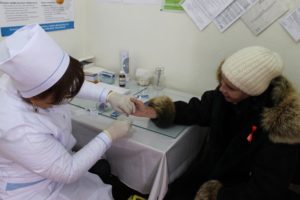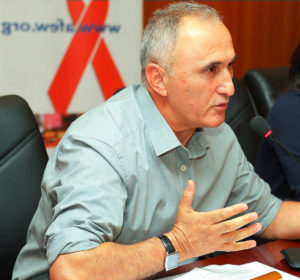Author: Olesya Kravchuk, AFEW International
The activities of AIDS Foundation East-West Tajikistan for already 15 years are directed into improving the health of key populations at higher risk of HIV infection. Last December HIV voluntary counselling and rapid testing point was opened in in the representative office of RPO AFEW-Tajikistan in the city of Qurghonteppa. Director of AFEW-Tajikistan Ikram Ibragimov tells about the achievements of the testing point and the organisation in general.
– How was the year of 2016 for AFEW-Tajikistan? What new and important things happened?
– The year was full with events. We changed the statute of the organisation, and we made the areas and directions of its activities wider. We also developed and approved the strategy of the development of the organisation for the medium term, strengthened the partnership and cooperation with governmental and non-governmental organizations in the health sector. We have our own new premises for our office. We renovated it, and have been working there for three months already. In November of the last year we elected the management of the organisation – the board, the audit committee and the director – for the years of 2017-2021. Generally speaking, I would say that 2016 was successful for us.
– Just recently you opened HIV voluntary counselling and rapid testing point in Qurghonteppa. Why did you choose this city to be the “base” for it?
– Our second office is situated in Qurghonteppa. That is why we decided to open HIV voluntary counselling and rapid testing point on the premises where key groups of population are already provided with the direct services. By the way, now we are the only NGO in the country that has such service. Besides, one of the main routes of Afghan drug traffic goes through Khatlon region and that is why drug addiction level in the region is high. People who use drugs are the main target audience for us. As a rule, donors and partners work in the capital and on the North of the country. We decided to go South.
 – What are the first results of HIV voluntary counselling and rapid testing point?
– What are the first results of HIV voluntary counselling and rapid testing point?
– Starting from December, 1 and up until December, 31 there were 18 people tested for HIV: 9 men and 9 women. Thanks God, there were no new cases of HIV found. People find out about our testing point from our website, media, business-cards that we disseminate, information from the clients who visit the centre themselves. Mostly, our visitors are representatives of key populations.
– At the end of 2016 you developed a draft of multilateral agreement on cooperation in the field of prevention of socially significant diseases in Khatlon region and the provision of medical, social and legal services for vulnerable groups. What does it mean?
– This agreement means the cooperation with different organisations that provide complex services (medical-psychological, social, legal and others) to key populations on many levels. The agreement is created on the existing epidemical situation with taking into consideration the socially significant diseases in Khatlon region in Tajikistan. It is planned that 46 government and non-government organisations of the region will become the members of the agreement. We strive to create favourable conditions for the clients of our social support services, so that they can get high-quality, timely and free services of certain specialists. The service should be affordable. Therefore, this memorandum is intended to lower the difficulty of access to services for key populations, and to create a basis for the integration of various services “under one roof.” This is so-called principle of “the single window.”
– What are AFEW-Tajikistan’s plans for 2017?
– As I mentioned before, last year we agreed upon the strategy of the organisational development for 2017-2019. Therefore, all our plans are directed into reaching the quality indicators of this strategy.




